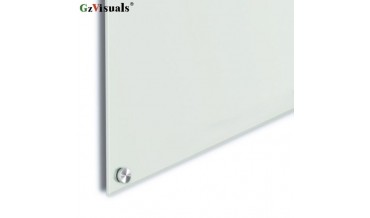
Dry-Erase Board Materials Explained: Find Your Perfect Fit!
09/08/2023
Dry-Erase Board Materials Explained: Find Your Perfect Fit!
Dry-erase boards are a must in every office, classroom, or home. They come in various materials, each with its own perks and drawbacks. Let's dive into the world of dry-erase board materials and explore what they bring to the table.
Porcelain Steel Dry-Erase Boards: Tough and Easy to Clean
Porcelain steel boards are rock stars when it comes to durability and erasability. They fuse porcelain onto a steel surface, resulting in a scratch-resistant, no-ghosting zone. Tough enough for heavy-duty usage, these boards wipe away even stubborn marks. Just note, they might be a bit pricier.
Melamine Dry-Erase Boards: Affordable and Portable
Melamine is another crowd-pleaser. Coating particleboard or MDF with melamine resin creates these lightweight and budget-friendly boards. They resist ghosting and scratches, fitting occasional use. But remember, they're not as tough as porcelain or steel for constant action.
Glass Dry-Erase Boards: Sleek and Chic
Glass boards offer a modern vibe, elevating any space. Sleek, scratch-resistant, and easy to clean, they're quite the catch. Yet, they're not light on the wallet and can be delicate.
Acrylic Dry-Erase Boards: Light and Strong
Acrylic boards won't break the bank. Light and durable, they're a breeze to install and clean. While not as erasable as porcelain steel, they're perfect for lighter tasks.
Laminate Dry-Erase Boards: Pocket-Friendly and Easy-Peasy
Laminate boards are budget winners. Simple to install and in various styles, they're great for homes and workplaces. They're erasable but not as sturdy as porcelain steel.
Painted Steel Dry-Erase Boards: Affordable and Magnetic
Painted steel is a wallet-friendly alternative. Naturally magnetic, they're coated steel. Quality varies, so read reviews. Higher-grade options, like the Secret Whiteboard, are perfect for moderate to heavy use.
Vinyl Dry-Erase Boards: Colors and Patterns Galore
Vinyl boards won't strain your budget. Lightweight and with options galore, they're not as durable or erasable as porcelain steel.
Pros & Cons of Dry Erase Boae
| Material | Pros | Cons |
| Porcelain Steel | Magnetic, Durable and highly erasable, Resistant to ghosting and scratches | Expensive |
| Melamine | Affordable and lightweight, Resistant to ghosting and scratches | Not as durable as other materials. Generally non-magnetic |
| Glass | Contemporary and sleek look, Resistant to ghosting and scratches, Easy to clean | Expensive, Heavy and fragile. Only some are magnetic. |
| Acrylic | Affordable, Lightweight and durable, Easy to clean | Not as erasable as other materials. Generally non-magnetic |
| Laminate | Affordable, Lightweight and easy to install | Not as erasable as other materials, Not as durable as other materials. Generally non-magnetic |
| Painted steel | Magnetic, Affordable, Lightweight, Easy to Clean, | Quality of material affects erasability. Durability depends on care. |
| Vinyl | Affordable, Easy to clean, Available in a variety of colors and patterns | Low Erasability, Low Durability. Non-Magnetic |
| Chalkboard paint | Affordable and easy to install, Can convert any surface into a dry-erase board | Not as erasable as other materials, Not as durable as other materials. Non-Magnetic |
Choosing Your Champion: A Wrap-up
In the end, dry-erase boards rock in diverse materials. For heavy-duty battles, porcelain steel shines bright. Budget-friendly options like melamine and painted steel work well but may not match porcelain's erasability. Glass adds style but comes at a cost. Acrylic, Laminate, and Vinyl are easy on wallets, but not as mighty. Consider your space's needs and pick the perfect sidekick!
